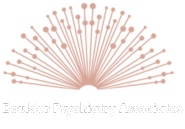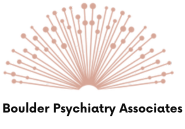So, Are My Meds About to Vanish?
First things first: nobody is carting off your Prozac or Adderall in handcuffs. Right now, we are living under an Executive Order (EO, which is political shorthand for “the president scribbled something in pen and now a committee has homework”) that created the Make America Healthy Again Commission. Its mission? Review SSRIs, stimulants, antipsychotics, mood stabilizers, and weight-loss drugs. “Review” is government-speak for “we will think about thinking about this, probably while ordering muffins at the meeting.”
- Number of psychiatric medications actually banned this year: 0
- Number of commissions launched to “study” them: 1
- Acronym behind the panic: EO (Executive Order, a presidential “because I said so” in legal ink)
But patients are not crazy for feeling nervous. This administration has already yanked long-standing approvals for things like mifepristone2 and has hinted that even household drugs like Tylenol3 and misoprostol4 might be “too dangerous for the masses.” When you have seen something as boring as acetaminophen dragged into a moral panic, suddenly Prozac feels like low-hanging fruit. The vibe is capricious, like they are pulling health policy ideas out of a hat labeled “controversy generator.”
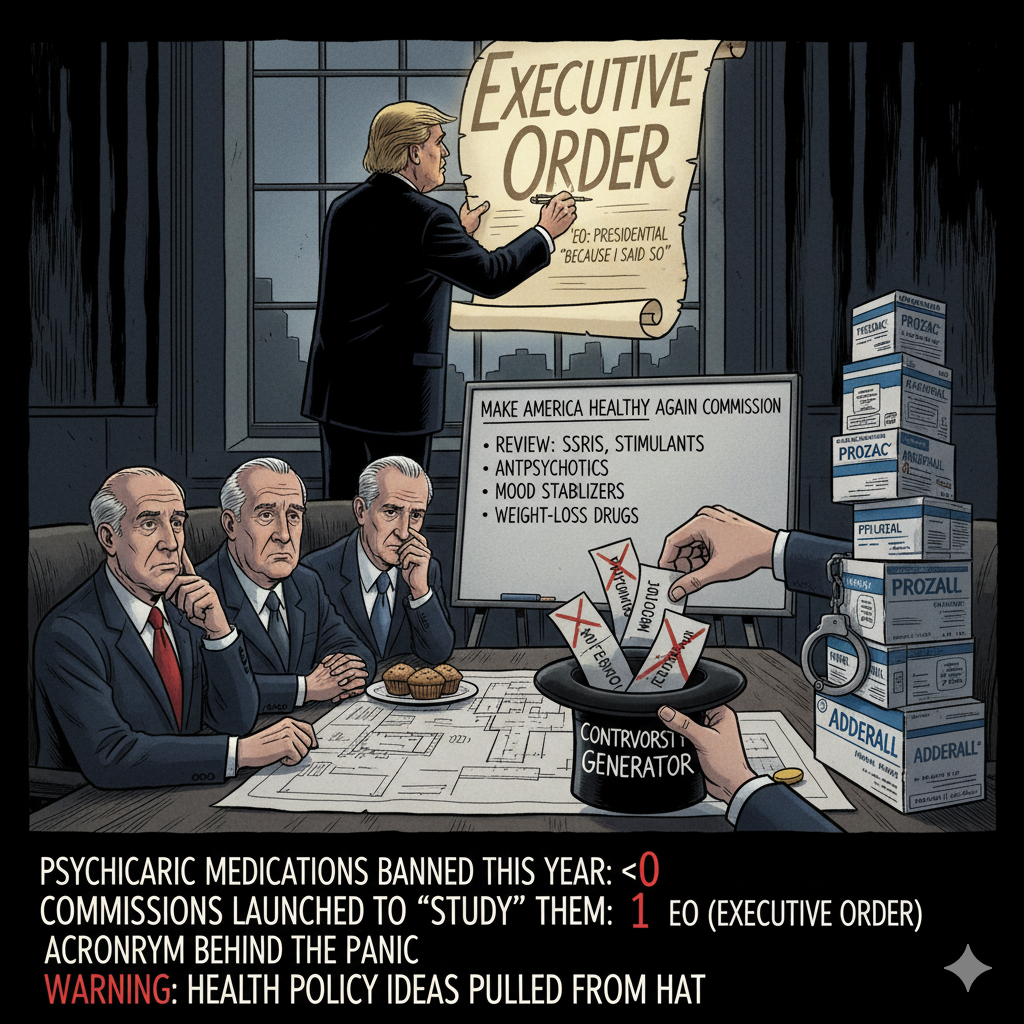
RFK Jr. vs. The Pill Bottles
RFK Jr. loves a villain, and psychiatric meds fit the bill. He talks like Prozac is the secret ingredient in school shootings.5 Meanwhile, his fans point to “victories” like removing red dye from Froot Loops6 or swapping canola oil for beef fat in fries.7 As if that is the health revolution America was waiting for. Here is the truth: sugar-laden breakfasts are the problem, not the dye that makes the milk turn pink.8 French fries are still French fries whether they taste like McDonald’s circa 1985 or like every mall food court since. Neither is curing depression, though both might fund cardiology residencies.9
- Psychiatric drug classes explicitly named in the EO: 4 (SSRIs, stimulants, antipsychotics, mood stabilizers)
- Times RFK Jr. has suggested SSRIs are connected to violence: multiple
- Times he has admitted Froot Loops’ sugar is a bigger threat to kids than Prozac: 0
This is the bait and switch: make it look like you are tackling health by attacking extras such as dyes, oils, and side ingredients while ignoring the main event of sugar, sedentary lifestyle, and portion sizes big enough to power a small village.10
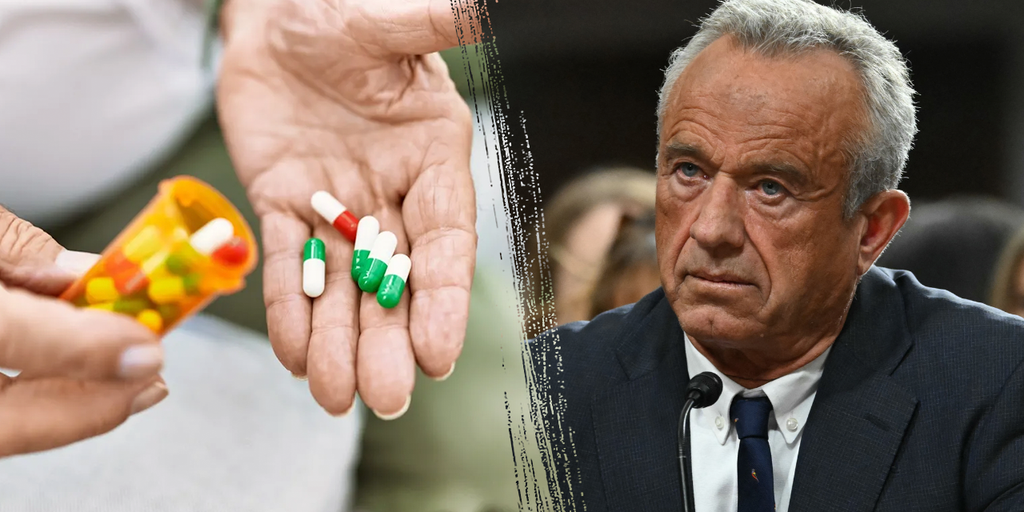
The Real Targets: Not You (Yet)
Patients sense the randomness here. They have watched this administration shut down century-old public health offices11, fire seasoned federal experts12, and spotlight drugs that have been safely used for decades. If Tylenol, the training wheels of medicine, can be treated like a controlled substance, what is stopping them from deciding Adderall is too scary? It does not help that RFK Jr. packages all this as “science” while simultaneously dismissing the actual evidence-based science.
- Drugs already under fire: mifepristone, misoprostol, vaccines, Tylenol
- Foods turned into moral battlefields: Froot Loops, fries, Skittles
- Americans eating fries on any given day: 36 percent13
- Americans actually harmed by neon cereal dye compared to sugar: sugar is winning in a landslide14
Compare that with Michelle Obama. Remember her “Let’s Move” campaign? She told kids to eat vegetables and run around a little. Republicans screamed like she was personally sneaking tofu into their rifles.15 Fast forward, and RFK Jr. promises the same “health crusade” but instead of pushing water over soda or recess over screen time, he is aiming at psychiatric meds, vaccines, and Tylenol. He has swapped out public health basics for pseudo-scientific targets. It is like taking a zero-sum approach to wellness. If chia seeds and exercise were “political,” then meds and vaccines have to go too.
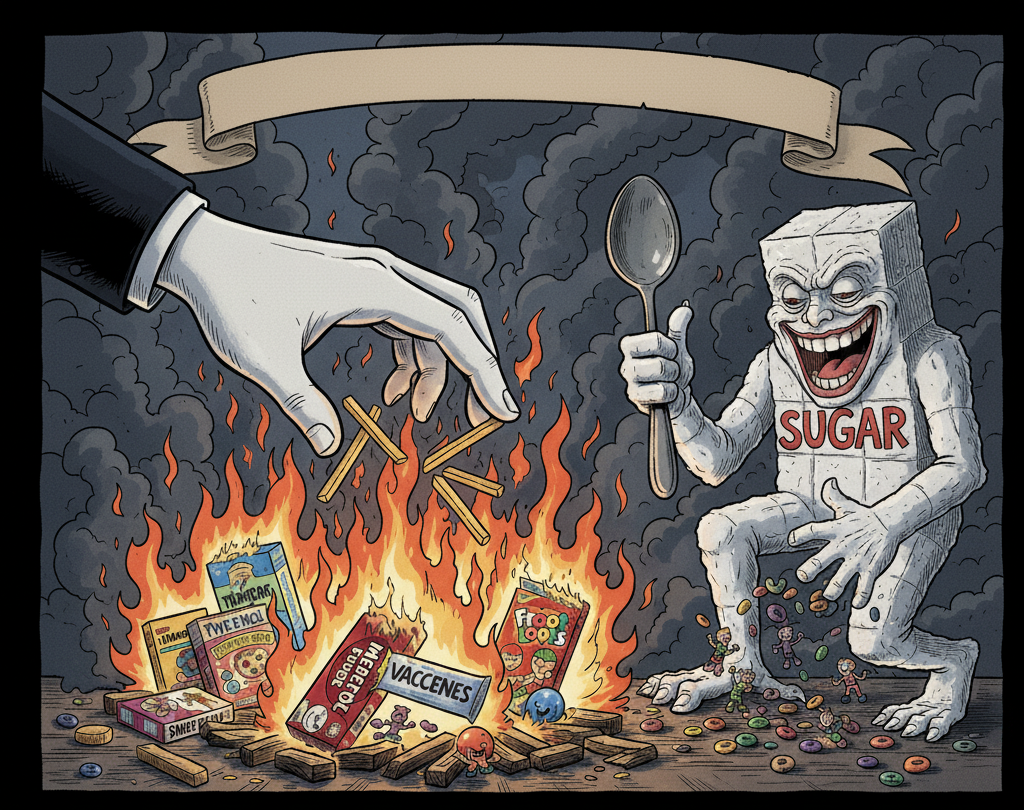
Should Patients Freak Out?
So no, patients should not freak. At least not yet. Bureaucracy does not sprint. By the time this commission wraps up its “urgent review,” two new Marvel reboots will have bombed, half the population will be on a new diet craze, and the rest will still be eating Pop-Tarts for breakfast. Changes will not be fast or sweeping. More likely, they will creep in as new warnings on labels, extra consent forms, or sudden prior authorization hurdles that make you nostalgic for fax machines.16
- Time a government commission takes to finish a report: 18 to 24 months17
- Time Twitter takes to melt down about said report: 18 to 24 seconds
- Time a sugary breakfast takes to derail your day: 90 minutes18
And if your prescription ever does hit turbulence, keep this in mind: psychiatrists still have plenty of other medications in their back pocket, including atomoxetine, guanfacine, and clonidine for ADHD22, plus a half dozen antidepressant classes like TCAs, MAOIs, SNRIs, atypicals, mirtazapine, and bupropion23. Translation: the shelves are not going empty.
Likely Plot Twists
Here is the likely story: the EO leads to scarier labels, maybe some new restrictions for young patients, and definitely more hoops for psychiatrists prescribing stimulants. Insurers will weaponize it instantly. Meanwhile, the public is told we are “healthier” because Froot Loops are slightly less neon. Spoiler: that will not stop the obesity epidemic, and it will not cure anxiety either.19
- Odds of an outright ban on Prozac, Zoloft, or Adderall: basically zero
- Odds of new black box warnings for kids and teens: fair to middling20
- Odds of insurers taking this as an excuse to deny claims: 100 percent21
- Odds beef-tallow fries reduce depression: 0 percent
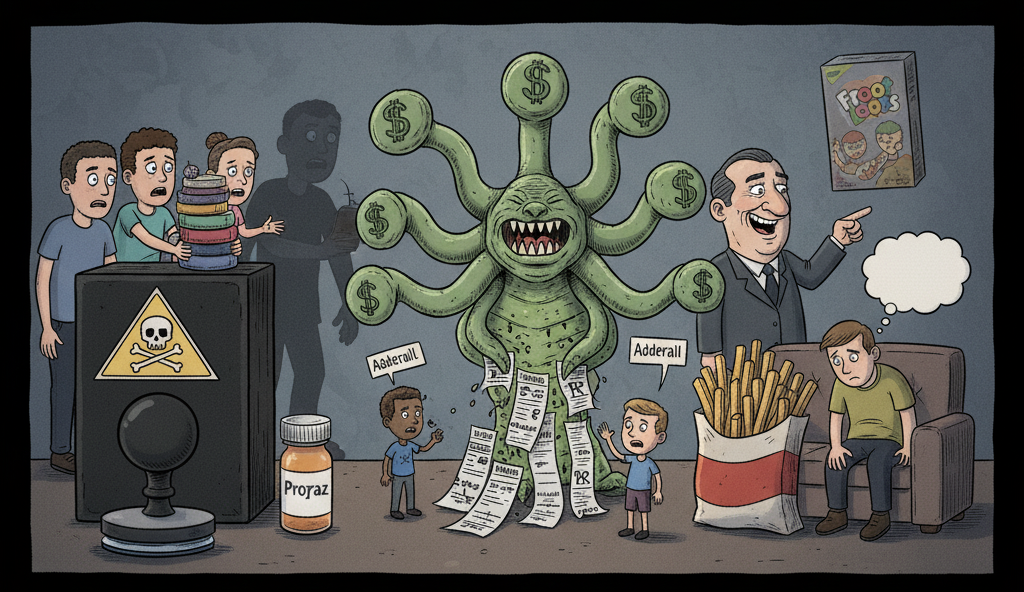
The Possible Upside (Yes, Really)
There is a chance, small but real, that this leads to more resources for non-pharmacologic care. Maybe insurers finally fund therapy. Maybe schools actually invest in recess instead of endless testing. But given the track record, it is more likely that we will just get scarier warning labels and fewer psychiatrists willing to wrestle with insurance. Meanwhile fries are still fries, and neon cereal is still sugar in drag.24
- Percent chance this leads to better discussion of overmedicating kids: 50
- Percent chance this leads to better insurance coverage for therapy, nutrition, or sleep clinics: 20
- Percent chance this is political theater: 110
The Insurance Circus: Why You Are Paying Cash for Your Brain Care
Here is why your psychiatrist is not in-network. Insurance does not like paying for talking. It likes paying for surgeries and scans. Psychiatrists got tired of sending five pages of paperwork just to get 60 dollars months later, if at all. So, they opted out. Now patients expect to pay cash because it is the new normal. Was it always this way? No. In the 1980s and 1990s, psychiatrists were more likely to take insurance. Then reimbursements shrank, paperwork grew, and most realized they could stay sane by charging privately.25 Patients lose financially, psychiatrists gain autonomy, and insurers quietly save money.
- Percent of psychiatrists in private practice who do not take insurance: the majority26
- Average time insurers delay payment: weeks to months
- Amount psychiatrists are reimbursed for an hour-long visit: often less than your plumber charges for 15 minutes
- Who wins when psychiatrists ditch insurance: everyone except patients who cannot pay out of pocket
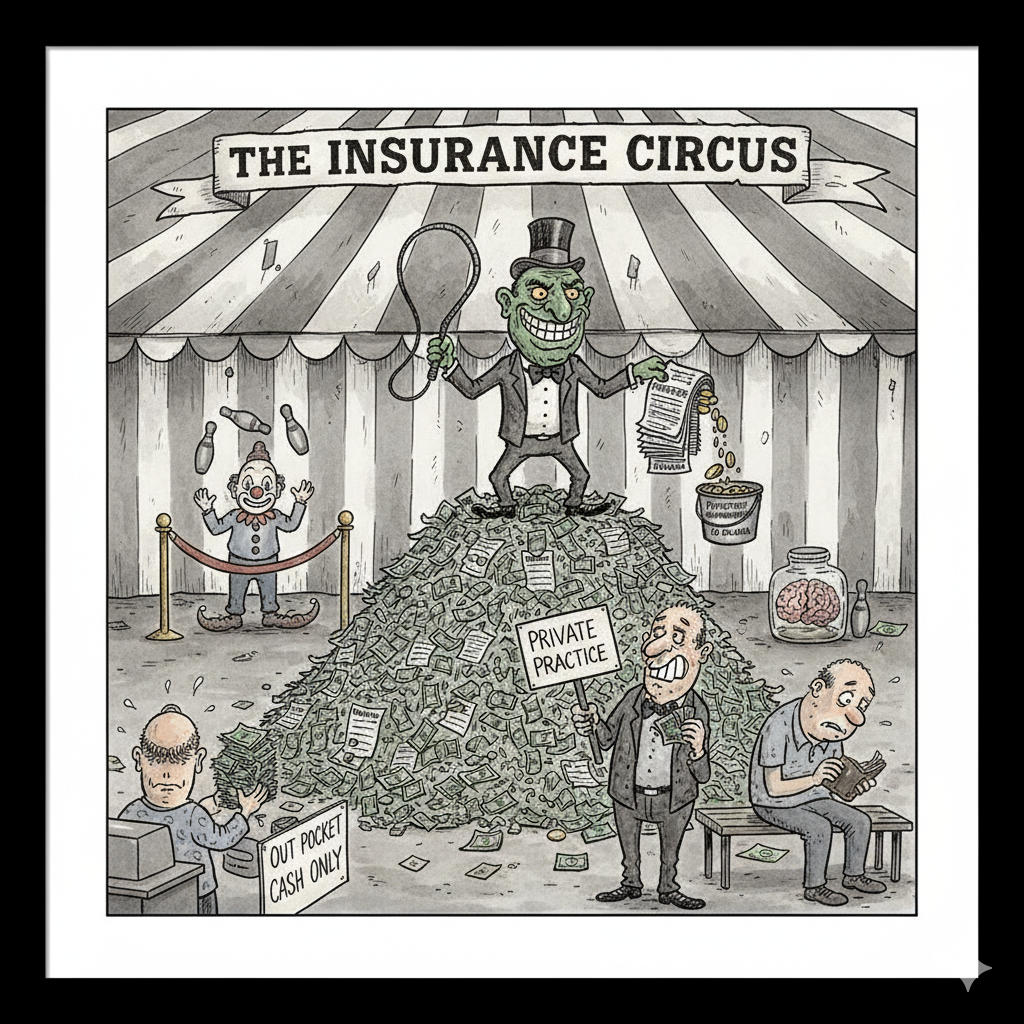
Your meds are not banned. They are under review, which is bureaucrat-speak for procrastination (an ADHD symptoms!). Executive Order just means the president signed a piece of paper, not that Zoloft is vanishing tomorrow. Insurance does not cover most private psychiatrists because it hates paying for talking. If stimulants ever get trickier, there are other meds like atomoxetine, guanfacine, and clonidine. And yes, fries in beef fat are still fries. Michelle Obama told kids to eat vegetables and exercise, and half the country lost its mind. RFK Jr. is saying the same thing, but with pseudoscience instead. Please do not quit your meds because of a headline, and maybe skip the Froot Loops for breakfast.
I hope this essay engenders lots of comments. I am trying to remain objective in a world that is increasingly irrational. Visit my website: www.boulderpsychiatryassociates.com. Or, if you are in our lovely town of Boulder, please stop by. I always have home-baked cookies.
Footnotes:
- Executive Order 14212, “Make America Healthy Again Commission,” Federal Register, February 2025. ↩
- Food and Drug Administration, “Mifepristone and Misoprostol for Medical Termination of Pregnancy,” FDA Safety Review, 2023. ↩
- U.S. Department of Health and Human Services, “Acetaminophen Safety Review,” HHS Report, 2024. ↩
- American College of Obstetricians and Gynecologists, “Misoprostol: Clinical Guidelines,” Obstetrics & Gynecology, 2022, Vol. 140(6), pp. 1279–1290. ↩
- Kennedy, R.F. Jr., Public Statements on SSRIs and Violence, C-SPAN, 2023–2025. ↩
- Center for Science in the Public Interest, “Food Dyes: A Rainbow of Risks,” CSPI Report, 2021. ↩
- Schlosser, Eric, Fast Food Nation, Houghton Mifflin, 2001, pp. 117–119. ↩
- Lustig, Robert H., Fat Chance: Beating the Odds Against Sugar, Processed Food, Obesity, and Disease, Hudson Street Press, 2012. ↩
- Mozaffarian, Dariush et al., “Changes in Diet and Lifestyle and Long-Term Weight Gain in Women and Men,” New England Journal of Medicine, 2011, 364:2392–2404. ↩
- Nestle, Marion, Food Politics: How the Food Industry Influences Nutrition and Health, University of California Press, 2013. ↩
- National Institutes of Health, “History of Federal Public Health Agencies,” NIH Archives, 2023. ↩
- Washington Post, “Federal Health Experts Dismissed in Agency Restructuring,” January 2025. ↩
- Bowman, S.A., “Food Choices of U.S. Adults on a Typical Day,” USDA Economic Research Service, 2020. ↩
- Hu, Frank B., “Sugar Consumption and Health,” Lancet Diabetes & Endocrinology, 2014, 2(8): 715–726. ↩
- Obama, Michelle, American Grown: The Story of the White House Kitchen Garden and Gardens Across America, Crown, 2012. ↩
- Government Accountability Office, “Timelines for Federal Health Commission Reports,” GAO Report, 2019. ↩
- National Academies of Sciences, “Typical Duration of Federal Health Policy Reviews,” NAS Policy Analysis, 2020. ↩
- Benton, David, “Carbohydrate Ingestion, Blood Glucose, and Mood,” Biological Psychology, 2002, 52:137–152. ↩
- World Health Organization, “Obesity and Overweight Fact Sheet,” WHO, 2022. ↩
- Food and Drug Administration, “Black Box Warnings and Safety Labels,” FDA Guidance, 2021. ↩
- Kaiser Family Foundation, “Prior Authorization in Mental Health Care,” KFF Brief, 2022. ↩
- American Academy of Child and Adolescent Psychiatry, “Practice Parameter for ADHD,” Journal of the American Academy of Child and Adolescent Psychiatry, 2007, 46(7):894–921. ↩
- Stahl, Stephen M., Stahl’s Essential Psychopharmacology, Cambridge University Press, 2021. ↩
- American Psychological Association, “Effectiveness of Nonpharmacological Interventions,” APA Review, 2020. ↩
- Grob, Gerald N., From Asylum to Community: Mental Health Policy in Modern America, Princeton University Press, 1991. ↩
- Levin, Alan, “Why Psychiatrists Don’t Take Insurance,” Psychiatric Times, 2019. ↩
